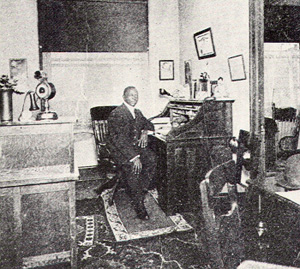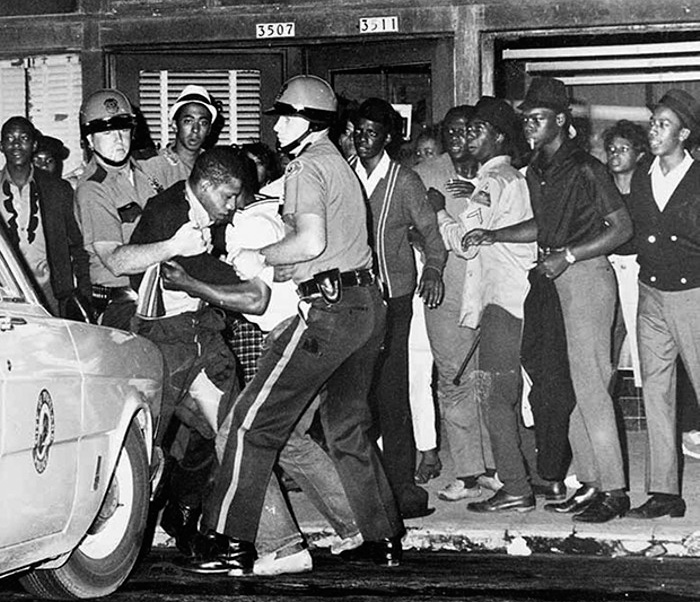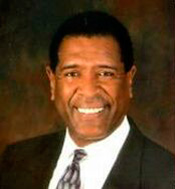 The Advocate newspaper served as an influential voice of the Black community in Portland beginning in 1903.
The Advocate newspaper served as an influential voice of the Black community in Portland beginning in 1903. Although this exhibit focuses on the 1840 to 1870 time period, Oregon continued to struggle with racial equality as demonstrated by the following chronology of later national and Oregon developments:
November 2, 1900
Oregon voters reject a proposal to repeal the exclusion clause in the constitution.
1903
The Advocate, a weekly newspaper for the “intelligent discussion and authentic diffusion of matters appertaining to the colored people, especially of Portland and the State of Oregon,” was started. It included societal news (i.e. births, deaths, marriages, etc.), editorials, job announcements, civil rights issues, etc.
1904
George Hardin becomes the first, African-American in Portland, to be named as a police officer.
1914
Portland’s chapter of the NAACP is founded and is the oldest, continuously chartered chapter west of the Mississippi.
1921
Ku Klux Klan organizes chapters in Oregon.
1922
Beatrice Cannady becomes the first, African-American woman to graduate from Lewis & Clark Law School.
1926
Exclusionary Clause is removed from the Oregon Constitution.
1927
State Constitution is amended to remove voting restrictions against African and Chinese Americans.
 Proponents of Oregon's 1953 Public Accommodations Bill, also known as the Civil Rights Bill. The legislation required "full and equal accommodations, advantages, facilities and privileges of any place of public accommodation, resort or amusement, without any distinction, discrimination or restriction on account of race, religion, color or national origin.” Enlarged image courtesy of the Oregon Historical Society.
Proponents of Oregon's 1953 Public Accommodations Bill, also known as the Civil Rights Bill. The legislation required "full and equal accommodations, advantages, facilities and privileges of any place of public accommodation, resort or amusement, without any distinction, discrimination or restriction on account of race, religion, color or national origin.” Enlarged image courtesy of the Oregon Historical Society. 1951
Law repealed prohibiting inter-racial marriage.
1953
Public Accommodations’ Law prohibits racial discrimination by businesses.
1954
Supreme Court upholds
Brown vs. The Board of Education of Topeka, abolishing segregated schools.
1957
Oregon Fair Housing Act passes.
1959
The Oregon Legislature ratifies Fifteenth Amendment 90 years after its adoption in the United States.
1964
National Civil Rights Act passes outlawing unequal voter registration requirements; and racial segregation in schools, workplaces, and public places.
 Portland was one of many cities to experience race riots in the late 1960s. (Image courtesy Oregon Historical Society)
Enlarge image
Portland was one of many cities to experience race riots in the late 1960s. (Image courtesy Oregon Historical Society)
Enlarge image 1965
Congress passes the Voters’ Rights Act, prohibiting qualifications or pre-requisites to vote.
1967
Racial tensions result in riots in Portland.
April 25, 1973
Oregon re-ratifies the 14th Amendment 105 years after rescinding their ratification and actual ratification by 28 states.
1984
Margaret Carter becomes the first African-American woman elected to the Oregon Legislature.
 Jim Hill served as Oregon's first Black statewide official in 1992.
Jim Hill served as Oregon's first Black statewide official in 1992. 1988
African exchange student, Mulugeta Seraw, is killed in Portland by racist “skinheads.”
1992
First African-American, James A. Hill, Jr., is elected to statewide office as State Treasurer.
2002
Measure requiring the removal of racist language from the State Constitution passes.
2007
Oregon Equality Act passes.